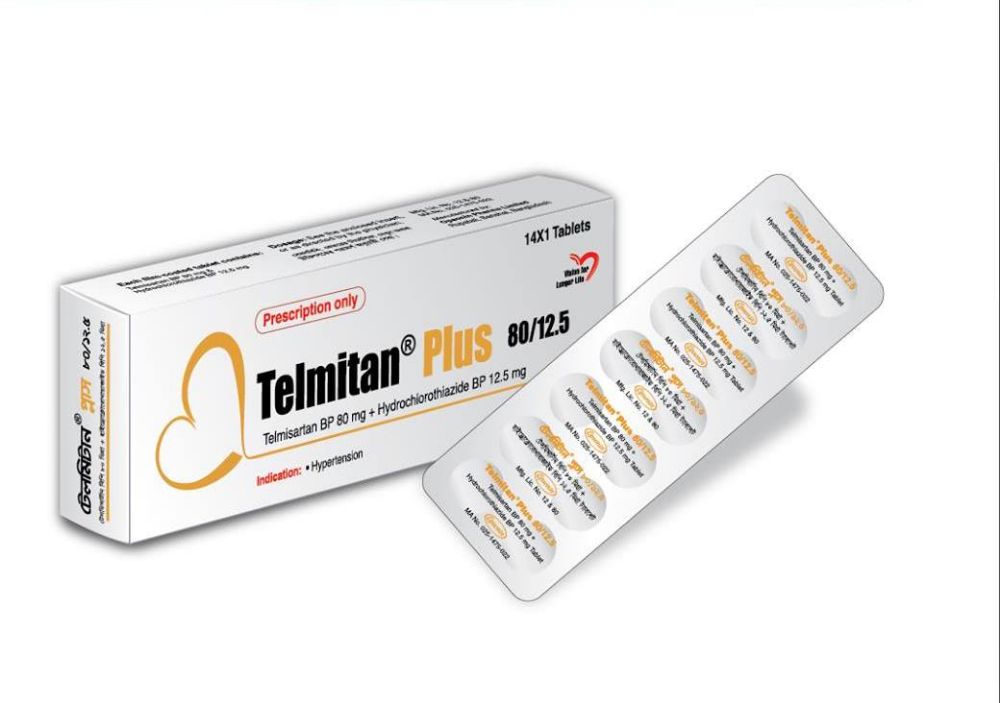
Type:14 Tablets
Generic Name:Hydrochlorothiazide + Telmisartan
Manufacturer:Opsonin Pharma Limited
Price:৳280.00
Hypertension, Diabetic nephropathy
May be taken with or without food.
Oral Hypertension Adult 1 tab (40-80 mg telmisartan/12.5-25 mg) once daily. Max: Telmisartan 160 mg & hydrochlorothiazide 25 mg daily. Hepatic Impairment Initiate therapy with low dose; titrate slowly; monitor
Renal impairment Dose adjustment not necessary Hemodialysis patients are more susceptible to hypotension
Severe hepatic impairment, biliary obstructive disorders. Pregnancy. Lactation.
Hydrochlorothiazide inhibits the reabsorption of Na and chloride in the distal tubules causing increased excretion of Na and water K and hydrogen ions. Telmisartan is a nonpeptide AT1 angiotensin II receptor antagonist. It exerts antihypertensive activity by preventing angiotensin II from binding to AT1 receptors thus inhibiting the vasoconstricting and aldosterone-secreting effects of angiotensin II.
Hepatic insufficiency, biliary obstruction, renal impairment, renaly artery stenosis. Correct volume depletion before initiating treatment. Monitor serum potassium levels regularly, especially in elderly and renally-impaired patients. Lactation: discontinue drug or do not nurse
1-10% Telmisartan Upper respiratory infection (7%),Urinary tract infection (1%),Back pain (3%),Diarrhea (3%),Myalgia (3%),Fatigue (1%),Sinusitis (3%),Peripheral edema (1%),Chest pain (1%),Hypertension (1%),Dyspepsia (1%),Headache (1%),Dizziness (1%),Pharyngitis (1%) Frequency Not Defined Hydrochlorothiazide Anorexia,Epigastric distress,Hypotension,Orthostatic hypotension,Photosensitivity,Anaphylaxis,Anemia,Confusion,Erythema multiforme,Stevens-Johnson syndrome,Exfoliative dermatitis including toxic epidermal necrolysis,Dizziness,Hypokalemia and/or hypomagnesemia,Hyperuricemia Potentially Fatal: Rarely angioedema, rash, pruritus and urticaria.
Pregnancy Category: C (1st trimester); D (2nd & 3rd trimesters)
Lithium, kaliuretic diuretics, laxatives, corticosteroids, ACTH, amphotericin, carbenoxolone, penicillin G, salicylates, K-sparing diuretics, K supplements, K salt substitutes drugs that cause hyperkalaemia, digitalis glycosides, antiarrhythmic agents, drugs known to induce torsades de pointes, alcohol, barbiturates, narcotics, oral antidiabetics, insulin, anion-exchange resins, NSAIDs, nondepolarising skeletal muscle relaxants, pressor amines, allopurinol, Ca salts, beta-blockers, diazoxide, anticholinergics, amantadine, cytotoxics.